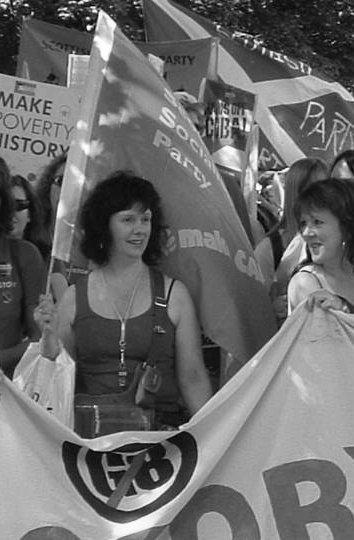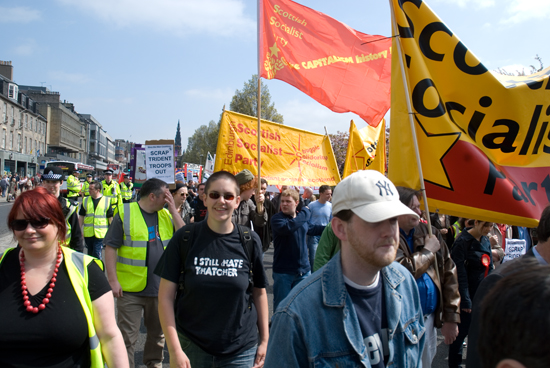Following the setback of May’s Scottish Parliament election results, June’s issue of Frontline magazine carries two contrasting articles on What next for Scottish socialism?
– one from SSP National Secretary, Pam Currie, the other from Gregor Gall. Mary McGregor responds.

We all knew the Scottish parliamentary results in May would be bad for the SSP. You could not go through the damaging Sheridan trial, the split in the party, the fall out from both these events and not expect an electoral disaster. But none of us really took in how bad it would be. Both Gregor Gall and Pam Currie cover this well in their articles and one would hope that it would provide a wake up call for socialists to realise once and for all, that here is no room for two socialist parties, fighting on virtually the same policies in Scotland today.
As I stood at the North East of Scotland count in Aberdeen, watching BNP supporters smile, the Solidarity supporters groan and our own supporters become more demoralised, the urge to get back home to Dundee and leave the night behind, became overwhelming.
Obvious target
Driving back down the A90 in the small hours, we were overcome with the need to blame someone. Disgust and horror at the unfavourable comparisons between our vote and Solidarity’s vote made Tommy Sheridan an easy and obvious target. There is no doubt in my mind that the political crime committed by Sheridan, the SWP and CWI of splitting the left in Scotland is a set back which will be regretted by generations to come. Even if we had no MSPs but still had the party intact, we would have been disappointed but we would have had a strong and dynamic force with which to rebuild and to focus on extra parliamentary activity. The SSP is now much weaker, much worse off financially and has substantially fewer activists than before the split.
The SSP is fragile and fractured but it does have a core of cadre and a democratic structure. Solidarity consists of two parties who hate each other (SWP and CWI), a number of individuals and a cult figure as leader. The credibility of the left in Scotland has been decimated and the only winner in the Sheridan libel trial was the British state, which has consequently had quite unprecedented access to both parties as it has carried out its investigations first into the libel case and subsequently into the perjury accusations.
Grotesque caricature
Gregor and others are right to point out that the objective political conditions were different in 2007 from our zenith electorally in 2003. But we did, as he says, Take a hit for allegedly ‘doing Tommy in
. The Tommy Sheridan brand turned out to be much more powerful than the SSP brand. In today’s celebrity-obsessed media, this is hardly surprising given Sheridan’s profile. With his name on every ballot paper, it also appeared as if Tommy himself was standing in every council and list seat the length and breadth of Scotland; quite a grotesque caricature of I’m Spartacus!
Frighteningly, the prospect of the perjury trial and or News of the World (NotW) appeal may in fact enhance Tommy’s image of everybody’s favourite socialist that ‘they’ are all out to get.
The courts are seldom places for socialists to fight their battles. Everyone in Solidarity’s leadership knows that Tommy was wrong to take the NotW to court. The leadership of the CWI tried to talk him out of it. This has been no victory for the working class of Scotland. The repercussions go way beyond appeasing one man’s ego. It is indeed in question whether either Solidarity or the SSP can ever regain credibility as a political force across Scotland and our position of being the most successful socialist party in the British Isles has gone.
Having no MSPs means that our access to the media is limited. We no longer get the headlines when we attack the hypocrisy of the SNP from a republican perspective or the imperialism of New Labour. At the moment, the only time Solidarity gets any press is when Tommy has notorious underworld figures like Paul Ferris on his Fringe talk show or the Sunday Herald speculates on the perjury trial. The SSP is getting very little coverage at all. This is all a far cry from front pages on Free School Meals bill or Faslane protests!

What happens next?
The most important question as Gregor suggests is what happens next? It is not clear how, or indeed whether, the SSP or Solidarity will survive the perjury trial but honest, hard-working committed socialists in both organisations will. How will we organise and take the fight for socialism forward when so many comrades feel profound disappointment and in some cases despair?
It must be so much worse for those comrades who thought, or still think that the SSP is the ultimate organisational form and will take us to socialism. In the RCN we have always believed that the SSP is the best organisational form so far, but we have always been conscious that as objective conditions change, then the form of socialist organisation may also need to change. We have been loyal SSP members but we have not been blind to its shortcomings or limitations.
The split has made the fight for socialist ideas more difficult in the coming period yet reunification in some form – ultimately the only way forward – is not on the cards in the short-term future. We cannot dismiss the profoundly painful and damaging experiences of some comrades over the last few years and demand they just have to get over it and reunite for the good of the class. This is naïve in the extreme. For one thing, it’s not over yet! There may be even worse to come if the perjury trial takes place.
On the other hand, those at the centre of the case cannot demand that those who have been less damaged do not consider how to move us collectively forward. There seems to be near hysteria in some quarters at the suggestion that SSP comrades even speak to others in Solidarity. But the experience of comrades across the country pre and post split has not been uniform. There are SSP members who are friends with others in Solidarity and those friendships have survived. There are others who have already found themselves in meetings with Solidarity members where the same hatred and bitterness which exists between the two leaderships has not prevailed.
The Solidarity candidate in the North East of Scotland publicly commended the SSP candidate and other SSP representatives as good socialists with whom he had no quarrel. I believe that disagreement with the isolationist approach of some leading SSP members should not be conflated with disloyalty.
Consequently, Gregor’s call for a new left unity party should not be dismissed out of hand but should be considered premature. The process by which this could happen is at a very early embryonic stage. Sadly both the SSP and Solidarity have to play out the perjury case and appeal. More people will be damaged and some people may go to jail – something no socialist should relish the thought of. The fall out from this next phase then has to be dealt with and only after all of that will we be able to work towards genuine growth and the prospect of principled work with former comrades can become a reality.
If both parties survive, I imagine all of us having to go through a pre alliance phase working in a principled united front basis with perhaps electoral accommodation being the next step. Surely everyone bar the most sectarian can see the folly of us standing against one another. Only after that long process will the prospect of a new party be on the cards. We have a long way to go.
Parochialism
Even though there are very hard times ahead, this does not mean that the SSP and especially those of us who have not been at the heart of the Sheridan case, should be paralysed. Gregor is right when he says we need to focus on getting involved in our communities and in the need for robust party education but I fear what he is arguing is a form of parochialism which will do nothing to give comrades the much needed credibility we agree is required.
So while I agree with him that comrades must be grounded
, I do not see this in opposition to espousing the high ideals of socialism
. The real skill of respected, socialist politicians is the ability to do both. We have to build our cadre in order to dig those deep roots that Gregor talks of and I do not see that happening without articulating a socialist vision. The starting point for this needs to be real political education and discussion within the party on what our vision of socialism should be in the 21st century.
This does not mean just taking the lead from current political thinkers within the party but by doing what I know is an anathema to some comrades and reading the texts of Marx, Lenin, Trotsky, MacLean, Connolly and others. We need to study new progressive movements like the Zapatistas in Mexico and the Bolivarists in Venezuela, and to develop our Marxism to take account of the events of the last 150 years.
Neither can the SSP be content with putting all its effort into community and trade union work, vital though these are. In Scotland, this would leave ‘high politics’ to the SNP. The SNP’s current diet of populist and consensual politics can not last. Wider events, such as the political fall-out from US and British imperialism’s wars, access to North Sea oil in the context of the rising oil prices, and the forthcoming Westminster imposed budget cuts, will form part of the ‘national conversation’, whether Alex Salmond likes it or not. When choices have to be made, the rightwards moving SNP will come down on the side of its business backers. It will also avoid any head on collisions with either the UK state or NATO.
When it comes to the constitutional issues there are strong pressures, within both the SSP and amongst the ‘Tommy can do no wrong’ supporters in Solidarity, to tail-end the SNPs political project of seeking an ‘Independence Referendum’. This isn’t likely to happen soon; nor is it likely to achieve what it seeks.
Real opposition needed
The SSP lost the political initiative when it abandoned the movement to build upon the Calton Hill Declaration. Instead the leadership opted to fall in first, behind the SNP leadership-policed Scottish Constitutional Convention and then, Independence First, run mainly by the political groups on the Scottish nationalist fringe. Neither of these bodies can lead the fight against either the British state’s Crown Powers, or Scotland’s continued involvement in NATO. Real opposition to both is needed, if moves to greater political independence are to open up better prospects for the Left and the working class.
Therefore, it is also vital that the SSP articulates a clear Scottish internationalist vision, based on sound democratic, secular and republican principles. Fortunately there is more chance of this happening within a democratic SSP, than in the political ‘marriage of convenience’ of left unionists and nationalists which constitutes Solidarity.
Nevertheless, we cannot live in a vacuum where Solidarity does not exist. Where we engage with them – and we must or we cut ourselves off from the anti war movement, the Palestine struggle, and any industrial dispute which occurs – we must act and be seen to act in a principled, non sectarian manner. If sectarianism occurs then it must not come from us. If Sheridan refuses to share a campaigning platform with us, then we must question his motives and whether he puts his personal animosity above the cause. We must not indulge in tit for tat retaliation.
I think Gregor is wrong in suggesting that we do not recruit to the party via united front work. We should not go on raiding missions but we should be open and honest about who we are, what we stand for and encourage people to join us. We can do that without resorting to sectarian lies or abuse. This will enhance credibility and put us on stronger ground for any future negotiations with former comrades.
Gregor is right when he says that the business as usual
approach is wrong but so is the politics of retreat. Weekly stalls are a façade if that is the only party work which is going on, but they are a way for hundreds of people weekly to get the message that the SSP and socialist ideas are still here.
Democratic bedrock
Most worrying about Gregor’s contribution was his dismissal of party branches. I see the branches as the democratic bedrock of the SSP. I know hat since the split, some individual members are isolated but the way to respond to that is not to turn us into a party of isolated individual members but to link vibrant branches with those who need support. I know that in some areas even where there are members, branches have not been functioning and a priority should be to engage those members who have had the courage and strength to stay with the SSP in a functioning and enjoyable party branch.
Many people out with the Central Belt fear that the party has long been dominated by Glasgow and Edinburgh in an insensitive way. Those in the other regions have felt, not without some justification, that we are second class party members in terms of the service we have received from party centre. I hope the Commission into Party structures will take account of this in its recommendations and will ensure that the party branch remains the basis of party building and democracy.
I am fearful of what would replace the branch. Would it be a party of self selecting Networks? How would representation be ensured at all levels? Yes we would get rid of the cult of the leader – all in favour of that – but we could be replacing it with the cult of the clique or a non elected leadership – not in favour of that one. I am sure that the commission will look to preserve and enhance what is best in our democratic structures and I see the branch as fundamental to that.

Defensive
But Gregor is to be commended for opening up the ‘Where next?’ debate. Pam’s response reflects, I think, a defensive and at times unrealistic position.
Pam is doing a brilliant job as party secretary and is part of a group of dedicated comrades who are holding things together in the eye of a hurricane. She correctly raises the issue of sexism within the SSP and its role in Tommygate. Issues around gender ran right through the court case and the subsequent split. Tommy’s public attitude to family life promoted a bourgeois stereotype with his wife Gail as the loyal partner whose main interests are fashion and the wean. However, Pam’s experiences over the Tommygate period colour her vision of the present and the future. Pam extols the virtues of the United Left organisation which I am sure was a terrific support to Pam and others at a very difficult time but she needs to see the negative effects of such a defensive grouping.
The UL assumed all pro party forces would join the UL – this was far from true. The UL assumed that their experiences and conclusions reflected those of party members across the country. This was also untrue. If the UL was to be seen as more than a support group for those being attacked by Tommy and Co, or more than a group of Tommy haters, then they should have become a bona fide platform within the SSP. Many outwith the eye of the storm were left saying, What was the point of that?
rather than, What a brilliant model for future democracy within the party
.
The future is unpredictable and precarious for socialists in Scotland. We all individually do make a difference but the need to work as part of a collective is essential for anyone who understands what socialism means. We need to build the SSP and look beyond our current boundaries. We need to prioritise socialist education and party democracy. We must seek to build a culture where the cult of the individual is recognised as anti socialist. Most importantly we must see that sectarianism is futile and unproductive. Let’s hope the lessons of these last few tumultuous years have been learnt – we have a responsibility to ensure a socialist party, with credibility exists to articulate the aspirations of all those who suffer under capitalism.
